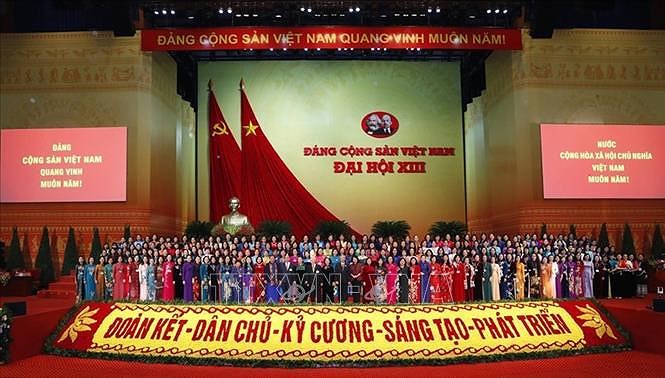 Party and State leaders pose for a group photo with women representatives at the 13th National Party Congress. (Source: VNA)
Party and State leaders pose for a group photo with women representatives at the 13th National Party Congress. (Source: VNA)
Hanoi (VNA) – A new study has confirmed the
important roles and significant contributions of female deputies to the National
Assembly and People’s Councils during the 2016-2021 term, and called on voters
to select competent and qualified candidates, regardless of their gender.
The study’s findings were shared and discussed on May
19 at a virtual thematic discussion, jointly convened by the University of
Social Sciences and Humanities (USSH - Vietnam National University in Hanoi),
the United Nations Development Programme (UNDP) in Vietnam, and other partners.
The study was funded by the Australian Government’s
Department for Foreign Affairs and Trade (DFAT), the Irish Embassy and UNDP in
Vietnam, through the Provincial Governance and Public Administration
Performance Index (PAPI) research framework.
It provides empirical evidence of how female deputies of the NA and provincial People’s Councils have contributed to the socio-economical and political development of the country over the past five
years.
The study was conducted with 248 deputies to the 14th
NA (or 50 percent) and 136 provincial People’s Council deputies of Hanoi, Binh
Phuoc province and Can Tho city.
Based on qualitative and quantitative research data,
the research suggests policy responses and actions to promote gender equity in people-elected bodies in Vietnam during the 2021-2026 period and towards 2030.
During the 2016-2021 term, the NA had its first female
chairperson and female delegates accounted for 26.8 percent. Women took up 26.7
percent of seats in the provincial People’s Councils during this term, as a
result of the 2016 elections.
The study, “Roles, Performance and Contributions of
Vietnamese Women Representatives During the 2016-2021 Period”, shows that given that their areas of focuses and strengths are different, both male and female elected representatives noted that the interest of voters in their
constituencies is the most important factor influencing their views of a
specific issue.
Women deputies more frequently engage with voters via
social networking applications than men representatives. Both of them were confident that they had promptly responded to voters’ proposals and
petitions. They noted that their top strength was in performing the legislative
mandate. In the meantime, interviewed provincial People’s Council deputies, men
and women alike, considered that oversight performance is the top strength.
In terms of values, both surveyed men and women
representatives from the National Assembly and provincial People’s Councils
valued the merits of ‘listening’, ‘having personal viewpoints’ and ‘having the
ability to persuade others’. Women representatives tend to value the merit of
‘having the ability to persuade others’ than their men counterparts.
“Women’s leadership in public sector is an important
issue as it is essential to have women’s perspectives and voices involved in
the decision-making process. Public policies should fully capture the
perspectives of both men and women to ensure equity and fairness,” reiterated Elisa
Cavacece, Deputy Head of Mission, the Embassy of Ireland upon the study
findings.
The study recommends accelerating implementation of Resolution
No. 26-NQ/TW adopted at the 7th plenum of the 12th Party Central Committee
which put it that by 2030: “There must be women representatives in the Standing
Committee of the Party at provincial level and Party committees at all levels:
the proportion of women representatives at all levels should be between 20 and
25 percent. The rates of women representatives in the National Assembly and
People’s Councils should be over 35percent”.
To do so, the report suggests having at least 45 percent
of candidates of either gender enlisted as candidates for the NA and People’s
Councils, building on the current momentum of having 45.28 percent of
candidates for the 15th NA.
The study also recommends creating favorable
conditions for elected representatives to proactively engage with voters via
all channels, especially social networking channels.
In addition, it suggests that elected women and men deputies
participate in all fields by introducing gender quotes for all NA and all
People’s Councils committees./.